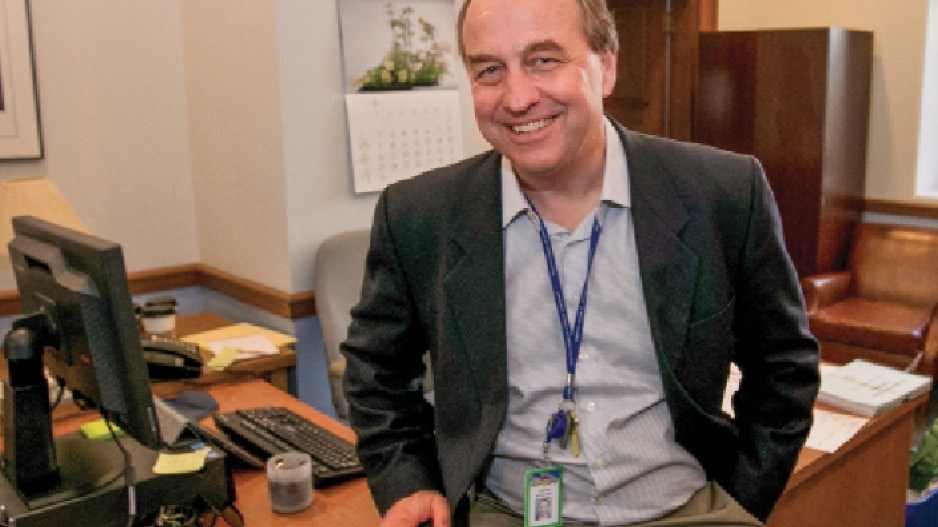It's fair to say that Andrew Weaver is a nerd.
The first Green Party MLA to be elected in B.C. holds degrees in mathematics and environmental physics.
He has worked in academia his whole life.
He believes in the power of politics to change the world for the better.
"I thought, if I publish another paper on permafrost carbon feedback, well that's really great, but there's others who can do that," he said of his decision to run in the provincial election.
"But how many scientists out there are there at this juncture who could step into the political framework and … have a chance of making a difference?"
The task he has set for himself is not an easy one. He is one of the few voices in the legislature to question whether liquefied natural gas (LNG) will deliver the economic benefits promised and to point out that it will come with hefty environmental consequences.
While the NDP scored green points by opposing pipelines during the provincial election – although a badly timed announcement against Kinder Morgan's plan to twin the Trans Mountain pipeline might have cost Adrian Dix the election – the party officially supports "sustainable LNG development" and "best practices around LNG and ... fracking."
To the Liberals, LNG is B.C.'s answer to Alberta's wealth-generating oilsands. LNG will create jobs, fill provincial coffers and create a made-in-B.C. prosperity fund, promises Premier Christy Clark.
There have been trade missions, conferences and a new government ministry, all devoted to developing a future LNG industry.
But Weaver, 51, thinks there's a different way forward for B.C.'s economy. He says B.C. has the capacity to develop a different kind of energy industry: clean technologies, such as wind, solar, biofuels and yet-to-be invented ways of generating and storing energy.
"This has the potential to be a huge market for innovation," said Weaver. "We already have an educated workforce in B.C. ready to take up the challenge."
Weaver grew up in Victoria, where he excelled in math and physics and later earned a degree in environmental physics. He studied at Cambridge for a master's degree in mathematics and got his PhD at the University of British Columbia. He returned to Victoria in 1992 to take a faculty position at the University of Victoria, which is where he stayed until being elected earlier this year.
He first became interested in climate change while studying oceanography in the late 1980s and early '90s. It was at that time that he began to speak more and more to the media on the emerging threat of climate change. At the time the topic was heating up: Canada was about to become a signatory to the Kyoto Protocol, the international agreement to reduce greenhouse gas (GHG) emissions (Canada withdrew from Kyoto in 2011).
Once petrified of public speaking, Weaver has overcome that through teaching and speaking to the media. The ability to hold forth may be genetic: Weaver said he comes from a long line of teachers and priests.
He is also not afraid to poke fun at himself: in fall 2012, he appeard repeatedly in an ongoing Victoria comedy theatre show – as himself.
In the 2000s, he was one of the lead authors of the Intergovernmental Panel on Climate Change (in 2007, the panel shared a Nobel Peace Prize with Al Gore). In 2007, he was named to the B.C. government's Climate Action Team, a group that included scientists and business leaders.
At that time, he saw the B.C. government, headed by Gordon Campbell, show leadership in combatting climate change. Policies like B.C.'s carbon tax and the Greenhouse Gas Reduction Targets Act were on the right track, he said.
That's changed.
"We went from a position of leadership to a rudderless ship," Weaver said. "It's not clear where we're heading."
Weaver is skeptical of the economics payoff of a future LNG industry. Combined with the environmental impact, it's too risky a bet, he said.
"The big companies, the Petronas, the BPs, the Shells, they're in all the plays," he said. "They're in Qatar, they're in Australia, they're in the States. They're not guaranteeing anything."
He questioned whether B.C.'s natural gas will be able to compete on price against other gas-producing regions.
The environmental consequences from horizontal drilling, the kind of hydraulic fracturing being done in northeastern B.C., are still unknown, Weaver said. Increased risk of earthquakes, high water use, tailings ponds and increased GHG emissions are some of the known results of fracking.
"It's just like trial by fire," he said.
Weaver believes that markets can find solutions to today's environmental woes – and most pressingly, climate change – but only if externalities, like water use and emissions, are priced. B.C.'s carbon tax is a good example of how to price emissions, Weaver said, pointing out the policy has resulted in a drop in driving in the province.
Until a few years ago, Weaver didn't think politics was for him. He said he was asked several times to run at the federal and provincial level by "several different parties," but said no until this year.
But giving an interview to a documentary filmmaker in 2009, Weaver found himself saying, "Scientists have done their job; it's time for politicians to do theirs."
The change of leadership in the Liberal Party and a drift away from advancing environmental policies gave him the inspiration to run.
"I thought it was the perfect time to give it a go," he said.
"We have a government that used to be pretty progressive in terms of its policy to greenhouse gas mitigation. Now we're moving to the same party having quite lacklustre policies on the same issue and the opposition wasn't being very clear at the time."




